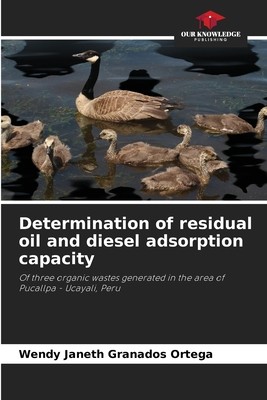
- We will send in 10–14 business days.
- Author: Wendy Janeth Granados Ortega
- Publisher: Our Knowledge Publishing
- ISBN-10: 6203765694
- ISBN-13: 9786203765694
- Format: 15.2 x 22.9 x 0.3 cm, softcover
- Language: English
- SAVE -10% with code: EXTRA
Determination of residual oil and diesel adsorption capacity (e-book) (used book) | bookbook.eu
Reviews
Description
The objective of this study was to determine the adsorption capacity of residual oil and diesel of three organic wastes generated in the area of Pucallpa, as a viable alternative in the use of waste. The experimental development was carried out at the National University of Ucayali in the facilities of the Forest Chemical Transformation Laboratory, in the District of CallerÃÂa, Province of Coronel Portillo, Department of Ucayali, using the Canadian method ASTMF-12 in its section "Oil adsorption short test". Three types of organic wastes (rice husks, sawdust and chicken feathers) were collected from industrial activities in the area of Pucallpa; these were conditioned and stored for subsequent testing, and two conventional adsorbents used for comparison were also acquired. To determine the adsorption capacity, two factors were evaluated: type of residue (rice husk, sawdust and chicken feather) and contact time with residual oil and diesel (10, 15 and 20 minutes). The results indicated that each type of residue presented different adsorption mechanisms and different time.
EXTRA 10 % discount with code: EXTRA
The promotion ends in 15d.16:47:28
The discount code is valid when purchasing from 10 €. Discounts do not stack.
- Author: Wendy Janeth Granados Ortega
- Publisher: Our Knowledge Publishing
- ISBN-10: 6203765694
- ISBN-13: 9786203765694
- Format: 15.2 x 22.9 x 0.3 cm, softcover
- Language: English English
The objective of this study was to determine the adsorption capacity of residual oil and diesel of three organic wastes generated in the area of Pucallpa, as a viable alternative in the use of waste. The experimental development was carried out at the National University of Ucayali in the facilities of the Forest Chemical Transformation Laboratory, in the District of CallerÃÂa, Province of Coronel Portillo, Department of Ucayali, using the Canadian method ASTMF-12 in its section "Oil adsorption short test". Three types of organic wastes (rice husks, sawdust and chicken feathers) were collected from industrial activities in the area of Pucallpa; these were conditioned and stored for subsequent testing, and two conventional adsorbents used for comparison were also acquired. To determine the adsorption capacity, two factors were evaluated: type of residue (rice husk, sawdust and chicken feather) and contact time with residual oil and diesel (10, 15 and 20 minutes). The results indicated that each type of residue presented different adsorption mechanisms and different time.


Reviews